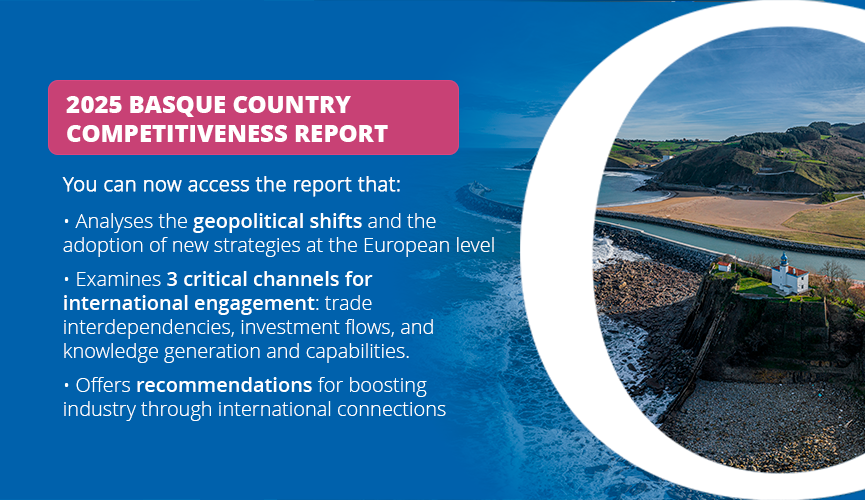
The Basque Country Competitiveness Report 2025 emphasises the vital role of international connection as a driver for Basque industry.
In the context of significant geopolitical shifts and the adoption of new strategies at the European and Basque regional levels, the report examines three critical channels for international engagement: trade interdependencies, investment flows, and knowledge generation and capabilities.
It also provides an in-depth analysis of the current state of competitiveness and wellbeing in the Basque Country compared to other European regions and explores several internationalisation-related indicators to identify opportunities and vulnerabilities.
Download Report Download Executive Summary
4 recommendations for boosting industry through international connections
The principles that have underpinned globalisation for decades, such as free trade, the liberalization of capital, and multilateral governance, are being reconfigured. In the current geopolitical and geoeconomic context industrial territories such as the Basque Country need to strengthen their capacity for adaptation and resilience, which implies transformations in the productive base, market diversification, the reduction of critical dependencies, and the strengthening of European alliances.
The 2025 Basque Country Competitiveness Report addresses international connections in trade, investment, people and knowledge, which are fundamental channels for boosting industry, and provides a series of recommendations that may be of interest to other regions:
- Establish new trade balances that diversify risks in a volatile context: The report urges the diversification of international markets, both by establishing new trade relations and by strengthening its physical presence in these territories. It also highlights the dangers of dependence on imports, particularly of energy and critical raw materials. Diversifying commercial risks through greater supplier diversity, strategic management of critical supply chains, and promoting connections between industry and advanced services will be key to diversify risks in a volatile context.
- Develop a new comprehensive and strategic investment paradigm that transforms and roots industry: We emphasise the importance of complementing the attraction of foreign investment with strategies that encourage local engagement, such as promoting participation in clusters and prioritising investment in transformative projects. The report promotes an internationalisation strategy that generates knowledge, skills and strategic functions in the Basque Country.
- Generate flows of people and knowledge that respond to the changing needs of industry: The report proposes making the most of the potential of Basque institutional structures abroad by strengthening the synergies between talent attraction initiatives and increasing the number of international students at universities and vocational training centres. It also aims to promote scientific and technological collaboration in strategic areas. This approach aligns with current public policies aimed at bolstering technical training, attracting specialised talent, and consolidating pivotal scientific and technological capabilities for industry.
- Strengthen and coordinate strategic intelligence, economic diplomacy and European cooperation mechanisms: in a highly volatile context, the three previous recommendations require us to equip ourselves with a sophisticated combination of strategic intelligence, economic diplomacy and European cooperation. It will be important to strengthen these mechanisms and the coordination between them in order to: increase the sophistication and immediacy of the strategic intelligence that reaches our industry and serves as the basis for our policies; strengthen relationships with the productive fabric (and in the political sphere) in parts of the world that are important to our companies; and reinforce cooperation with European regions, cities, clusters or member states in areas where there are specific shared challenges and/or complementary capabilities.
Panel of Territorial Competitiveness Indicators for Wellbeing
The Regional Competitiveness Observatory provides information on the dimensions that make up Orkestra's competitiveness framework for wellbeing. It collects data from more than 200 European regions and allows us to compare their position and evolution with respect to other regions, countries or the European Union as a whole.
The Observatory also collects the level and evolution of the 66 indicators included in the Basque Country Competitiveness Report. Available in 3 languages, it allows comparisons to be made with the EU-27 and offers data updated in real time.

![]()
Blog
#BeyondCompetitiveness
Not yet familiar with our blog? You can find posts from our researchers on energy, governance, public policy and much more.












